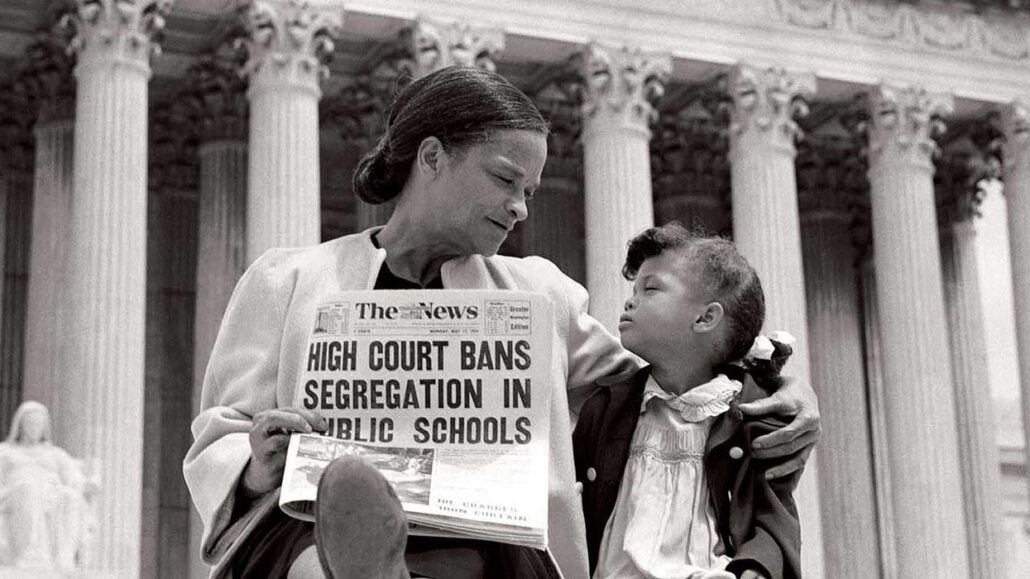By D. Kevin McNeir
It’s been a banner year for the officers, board of directors and staff of the Thurgood Marshall Center Trust (TMCT or the Center), Inc., as the Washington, D.C.-based, nonprofit organization hosted several entertaining and intellectually charged programs in celebration of the 70th anniversary of the historic Brown v. Board of Education Decision and to honor the contributions of Associate Justice Thurgood Marshall.
During the first event, held on Thursday, April 25, the legacy of Thurgood Marshall was touted at the Reginald F. Lewis Museum of Maryland African American History and Culture in Baltimore, Maryland – the city in which Marshall was born and where he established his law practice after completing his education at Howard University School of Law.
Noted scholars and civil rights icons who spoke during the event, “From Briggs to Brown: The Journey Towards Desegregated Education,” included Congressman Kweisi Mfume who shared memories of the impact that Marshall had on his life and emerging career in Congress; the erudite musings of Larry Gibson, University of Maryland law professor and author of “Young Thurgood – The Making of a Supreme Court Justice”; and longtime civil rights activist and leader, Dr. Benjamin Chavis Jr., NNPA president and chair of the board of directors, TMCT.
The celebration shifted to Washington, D.C. on Thursday, May 9, at the Thurgood Marshall Center Trust for Service and Heritage where the offices of the TMCT are based. The event served as the Center’s highly anticipated, annual commemoration of Marshall’s contributions to American society and the 1954 civil rights decision in Brown v. Board.
Ebony McMorris, White House Correspondent for American Urban Radio Network, moderated a discussion that focused on the history and life-changing implications of the Brown v. Board decision which declared that racial segregation of children in public schools, based on the doctrine of separate but equal, was unconstitutional, as well as the lesser-known case, Bolling v. Sharpe, which prohibited segregated public schools in the District of Columbia.
Panelists who joined McMorris and shared their expertise on the history and implications of the Brown v. Board decision included Kim Keenan, Esq., former NAACP General Counsel and past president, National Bar Association and the D.C. Bar; Dr. Jean Accius, Ph.D., president/CEO, Creating Healthier Communities; and Rawle Andrews Jr., Esq., a TMCT board member, executive director, American Psychiatric Association Foundation and 135th president, The Bar Association of D.C.; and Barbara Arnwine, Esq., president and founder of the Transformative Justice Coalition
TMCT, Inc. President/CEO Thomasina Yearwood gave opening remarks while Dr. Benjamin Chavis Jr., chair, TMCT board of directors and National Newspaper Publishers Association president, gave closing remarks. “The opportunity for equal education unfettered by racial discrimination cannot be overstated,” Yearwood said. “Thurgood Marshall and his colleagues from the NAACP broke down walls of injustice that changed the landscape for African American children forever. However, the work for equity for all continues and we must understand the past to continue to secure justice today and tomorrow.”
The celebration continued in Charleston, South Carolina, on Thursday, May 16 at The International African American Museum (IAAM) which partnered with TMCT, the Religious Affairs Department of the National Action Network, Charity Missionary Baptist Church and the Charleston community as they hosted a panel discussion, community conversations and the screening of the film, “Separate but Equal.” The movie was filmed in Charleston in 1991 and featured Sidney Poitier as Justice Marshall. After the viewing of the film, panelists, including the Reverend Nelson B. Rivers III, Dr. Chavis, Councilman Henry Darby and CCSD Chief Academic Officer Michelle Simmons, weighed in on the impact of the pivotal Briggs v. Elliott case – the first case to challenge segregation in education which ultimately led to the Supreme Court’s decision in Brown v. Board.
One day later, on Friday, May 17, a second panel was convened, again at the IAAM, where Brandon Reid, public historian at the IAAM, moderated a discussion led by Cecil Williams, the co-creator of South Carolina’s first and only civil rights museum; Dr. Bobby Donaldson, associate professor of history and the director of the Center for Civil Rights History and Research, the University of South Carolina-Columbia; and James L. Felder, one of the first African Americans elected to the South Carolina legislature after President Lyndon B. Johnson signed the 1965 Voting Rights Act.
As the Rev. Rivers, senior pastor, Charity Missionary Baptist Church, Charleston, had this to say during the discussion. “Because of [Thurgood Marshall’s] work, things in America changed for everybody,” he said. “There are folks who go places, enter buildings, have jobs and have the respect of others – not just Black folk but women, too. They all have better positions and greater opportunities because of Justice Thurgood Marshall.”
Joan Robinson-Berry, Valmont Industries board of directors, said Marshall’s courage and leadership changed the trajectory of her life and career. “The landmark decision of Brown v. Board opened up opportunities for all Americans,” she said. “I became an engineer, a Black woman, when it was not popular for women or minorities to enter the field. This is a celebration for all African Americans especially those who went into non-traditional fields for their careers.”
Finally, to culminate the 70th anniversary celebration, staff members of TMCT, led by Stacey Palmer and Garcia Williams, consultant, greeted hundreds of visitors in the exhibition hall during the 53rd Annual Legislative Conference of the Congressional Black Caucus Foundation in the District, Sept. 11-15. With a specially designed table that housed keepsakes for visitors and with words of welcome, TMCT displayed a video on a large screen TV that featured highlights from the Baltimore and Charleston events. It was a fitting conclusion to a six-month long celebration honoring Associate Justice Thurgood Marshall and reminding all Americans of the significance of the Brown v. Board decision.


